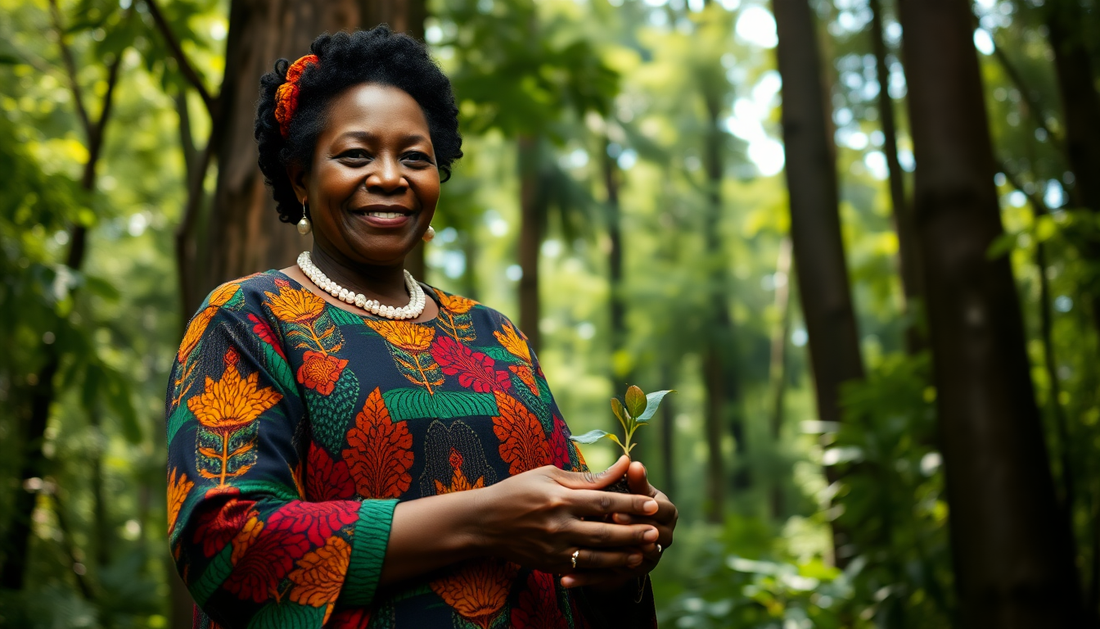Wangari Maathai was a true trailblazer, a woman whose unwavering commitment to environmental conservation and social justice transformed the lives of millions across Africa. As the founder of the renowned Green Belt Movement, she inspired a global movement that continues to shape the future of our planet.
Born in the rural highlands of Kenya, Maathai's early life was shaped by her deep connection to the land and her community. She witnessed firsthand the devastating effects of deforestation and environmental degradation, and it was this experience that would ultimately ignite her passion for environmental activism.
After completing her education, Maathai returned to Kenya and began her work with the National Council of Women of Kenya. It was here that she conceived the idea of the Green Belt Movement, a grassroots initiative that empowered women to plant trees and restore the country's rapidly disappearing forests. What started as a small-scale project quickly grew into a global movement, with millions of trees planted across Africa and beyond.
Maathai's work was not without its challenges. She faced fierce opposition from the Kenyan government, which saw her efforts as a threat to its political and economic interests. Undeterred, she continued to speak out, organizing protests and advocating for environmental and human rights. Her unwavering courage and determination earned her the respect and admiration of people around the world.
In 2004, Maathai's tireless efforts were recognized with the Nobel Peace Prize, making her the first African woman to receive this prestigious honor. The award was a testament to her belief that environmental conservation and sustainable development were inextricably linked to peace and social justice.
Maathai's legacy extends far beyond her own lifetime. The Green Belt Movement continues to thrive, empowering communities to take charge of their own environmental and social well-being. Her message of hope, resilience, and the power of grassroots action has inspired countless individuals and organizations to follow in her footsteps.
As we face the daunting challenges of climate change and environmental degradation, Wangari Maathai's story serves as a powerful reminder of the transformative power of individual action. Her life's work reminds us that we all have the capacity to make a difference, to be the change we wish to see in the world. By following in her footsteps, we can honor her memory and build a more sustainable, equitable, and just future for all.
Early Life and Education
Wangari Maathai was born in 1940 in the village of Ihithe, in the Nyeri district of Kenya. Growing up, she witnessed the rapid deforestation and environmental degradation that was transforming her beloved homeland. These early experiences would shape her lifelong commitment to environmental conservation and social justice.
After completing her primary and secondary education in Kenya, Maathai was awarded a scholarship to study at Mount St. Scholastica College in the United States. She went on to earn a master's degree in biology from the University of Pittsburgh and a doctorate in veterinary anatomy from the University of Nairobi, becoming the first woman in East and Central Africa to earn a Ph.D.
The Green Belt Movement
Maathai's groundbreaking work began in 1977 when she founded the Green Belt Movement, a grassroots organization that empowered women to plant trees and restore the country's rapidly disappearing forests. The movement's mission was to address the interconnected issues of environmental degradation, poverty, and gender inequality.
Under Maathai's leadership, the Green Belt Movement quickly gained momentum, with women across Kenya planting millions of trees and establishing community-based nurseries. The initiative not only helped to combat deforestation but also provided economic opportunities for women, who were able to earn income from the sale of seedlings and the harvesting of firewood.
Environmental Activism and Challenges
Maathai's environmental activism extended far beyond the Green Belt Movement. She was a vocal advocate for sustainable development, speaking out against the destructive practices of multinational corporations and corrupt government officials. Her outspoken criticism of the Kenyan government's land-grabbing policies and its disregard for environmental protection often put her at odds with the political establishment.
Despite the challenges she faced, Maathai remained steadfast in her commitment to her cause. She was arrested and imprisoned on numerous occasions, but her unwavering spirit and determination only strengthened the movement she had founded.
Awards and Recognition
Maathai's tireless efforts and remarkable achievements were recognized with numerous awards and honors, both in Kenya and around the world. In 2004, she was awarded the Nobel Peace Prize, becoming the first African woman to receive this prestigious accolade. The Nobel Committee cited her "contribution to sustainable development, democracy and peace" as the driving force behind the award.
In addition to the Nobel Peace Prize, Maathai received numerous other awards, including the United Nations Environment Programme's Global 500 Roll of Honour, the Légion d'Honneur from the French government, and the Presidential Medal of Freedom from the United States.
Legacy and Continuing Influence
Wangari Maathai's legacy continues to inspire and empower people around the world. The Green Belt Movement, which she founded, has grown into a global network of grassroots organizations dedicated to environmental conservation and community empowerment. Millions of trees have been planted, and countless lives have been transformed through the movement's work.
Beyond her environmental achievements, Maathai's life and work have become a symbol of hope, resilience, and the power of individual action. Her unwavering commitment to social justice and her belief in the transformative power of grassroots movements have inspired a new generation of activists and leaders to follow in her footsteps.
As we face the daunting challenges of climate change and environmental degradation, Wangari Maathai's story serves as a powerful reminder that we all have the capacity to make a difference. By embracing her vision of a more sustainable, equitable, and just world, we can honor her memory and build a brighter future for generations to come.

